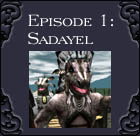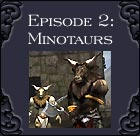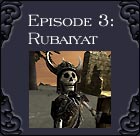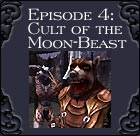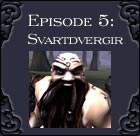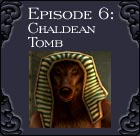You don't know anything about mud before you've tried running for your life through
the swamps of Morak. The festering depths of the orkish kingdom are home to
so many aspects of the stuff that you'll emerge - if at all - with a deeper
understanding of mud's true and manifold nature.
There's black and sticky mud which sucks your boots off; there's brown and
slippery mud which facilitates falling down; there are pools of murky mud which
reach to a man's chest. And If you ever stop to remove some of the mud you've
accumulated, ferocious mosquitos attack like ravenous packs of small, pointy
wolves.
Slightly more than three years ago, I myself was obliged to explore the orkish
interior on foot and with some urgency. While I won't bore you with details
of the misunderstanding that caused this, it involved a disagreement over the
correct number of Spiky Clubs in a deck of orkish Dunkar cards, and whether
one of those Clubs should - at any time during play - protrude ever so slightly
from my left sleeve.
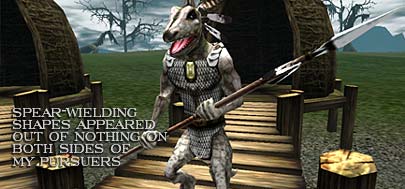
The dispute resulted in five orkish warriors chasing me through some nameless
Morak swamp, and from what I could tell, they were gaining quickly. The sound
of huge splashing feet grew steadily louder, and while I heard my pursuers
share an occasional, guttural laugh, I didn't think that all six of us would
find the next hour equally entertaining.
"There's skinny now!" I heard one of them shout, "We've got
'im! Come here, you lit-"
Somewhat surprisingly, the ork was interrupted by a blue and luminous arc
of lightning, which curved over my shoulder and hammered into his breastplate.
Almost simultaneously, while blue light still lingered and the stricken ork
still sailed backwards, spear-wielding shapes appeared out of nothing on both
sides of my pursuers.
"Make down, Mercian!" a shrill voice behind me commanded, and while "Get
down, northman!" would have been preferable, this was not a time for splitting
hairs. As I plunged myself into the swamp, I heard a loud crackling sound directly
overhead, and the sharp smell of lightning filtered through my mud-packed nostrils.
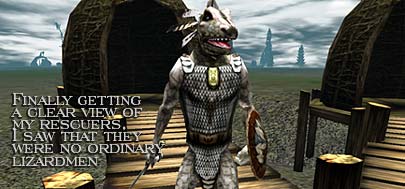
"Lizard ambush!" I heard an ork shout, and then came the sound of
grunting and shouting as - presumably - volleys of spears found their targets.
After remaining prone for a few seconds, I surfaced carefully to have a look
at the proceedings. But before my eyes were clear enough to see, it was all
over: The orks lay dead, and what looked like lizardmen were looting their
corpses. While the ambush had worked beautifully, an ork must still have reached
a line of spearmen, because two reptilian fellows had also fallen.
Finally getting a clear view of my rescuers, I saw that they were no ordinary
lizardmen. For one, their skin was a much darker shade of green, and a jagged
spinal ridge ran from their tails to their foreheads. More remarkably,
these people wore chainmail armour, carried shields adorned with the images
of serpents, and wielded gracefully curving swords - in addition to the silver-tipped
spears that they had employed so effectively in the ambush. As you probably
know, the garden-variety lizardman is a dim-witted brute who barely knows how
to pick up a rock and throw it.
"You make up again now, Mercian," said the same voice that had told
me to "make down" a few moments earlier. Hauling myself up, I saw
that the voice belonged to a bare-chested reptilian who wore an impressive
headpiece bearing cascades of colourful bird feathers. He seemed older than
the others and was leaning quite heavily on a long staff, which was decorated
with more feathers and what looked like dangling bits of bone.
"Make safe in village of Sadayel," he said in his spectacularly
broken version of the common tongue, "we help more. Enemy of the ork,
friend to Draupnir's people."
While I only understood parts of what he was saying, I gratefully accepted
the offer of sanctuary. While we shook hands and exchanged pleasantries, the
other reptilians gathered around, talking with excited voices in a language
I didn't recognize. Finally, one of them wiped a bit off mud off my jacket,
then held his hand up while speaking incomprehensibly to the others. Clearly,
he had said something profoundly funny, because they all began laughing and
pointing. Inevitably, the comedian lizard smashed home with another short sentence,
which had them howling with laughter and clutching their scaly bellies. "Yes,
very muddy," I said, trying to convince myself that I was sharing a laugh
with these people, not simply being laughed at. Again.
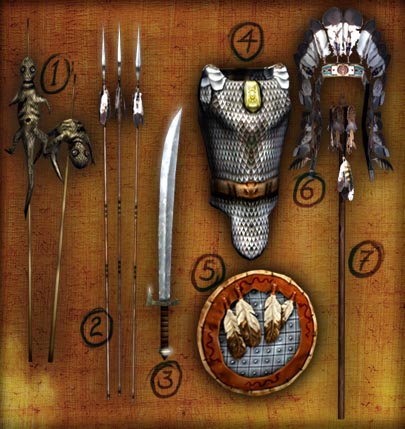 |
1: Lizard-on-a-stick, a local delicacy
2: Silver-tipped and feather-clad spears
3: Sadayel swords have a softly curving shape
4: Chainmail worn
by Sadayel warriors
5: Notice the serpent shapes on this shield
6: The
headpiece of a shaman
7: The shaman's staff is a symbol of authority |
After a short but strenuous walk through ankle-deep mud, we came to the outskirts
of a forest. Within it, the mud-gruel of the plain was replaced by a green
and spongy surface, and travel immediately became easier. On a less positive
note, the smell of rotting vegetation grew steadily more overwhelming as we
entered the forest depths, though this didn't seem to affect the Sadayel in
the slightest. They were clearly in their element here, and seemed more relaxed
now that trees obscured our presence.
Though we were far from the capital, Iron Ork patrols had grown frequent in
this region lately. According to the barkeep at the inn where I had enjoyed
a comfortable (and rather profitable) stay until earlier that evening, one
of the local goblin tribes had rebelled recently, refusing to pay its yearly
tribute of slaves. As was the routine in such cases, he said, King Grrak's
Iron Orks were now preparing a retaliatory campaign that would leave the local
goblins broken but not extinct. They would then allow the goblins five or six
years of unimpeded breeding before re-imposing the slave tax. Not for the first
time, I was amazed by the intelligence displayed by the Orks of Morak, who
seemed to be a far more sophisticated breed than the Gray Orks I had encountered
in subterranean lands.
As the last rays of sun filtered through the sparse crowns of the rotting
forest, a hand touched my shoulder. "Issat kraag, Mershan," one of
the Sadayel spearmen said, rather enigmatically. More usefully, he pointed
through the trees and towards some carefully concealed buildings, which huddled
together in the centre of a lightly wooded hollow. Without guides, it would
have been possible to walk within ten meters of that village, and yet remain
oblivious to its existence. "Yes. Welcome to village," said the headpiece-wearing
Sadayel, who appeared to be the only one in the group who spoke the common
tongue, after a fashion. "You make rest and eat," he continued. "Then
we make safeness to Mercian border."
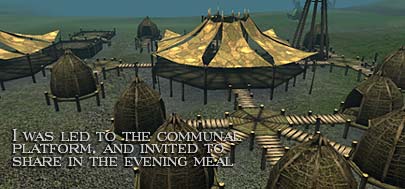
The Sadayel village consisted of simple huts made of wooden frames covered
by layers of grass and foliage. The huts stood on small but sturdy-looking
platforms, and they seemed to radiate outwards from a much larger platform,
to which the whole village was connected by a network of gangways. A stout
watchtower, which stood on the eastern edge of the village, had been carefully
concealed among twisted and rotting trees.
When we arrived at the village, the Sadayel were busy preparing an evening
meal on a large, open fireplace which dominated the central platform. Visitors
were clearly not an everyday occurrence, and as soon as my headpiece-wearing
friend announced my presence, they dropped whatever they were holding and crowded
around me. Once again I was subjected to a friendly but close examination which
included large amounts of poking and pinching, and it was obvious that very
few of these Sadayel had ever seen a human before. Since the Mercian border
was just around the corner, geographically speaking, it was also obvious that
these reptilians were no globetrotters.
After the first wave of curiosity had waned, I was led to the communal platform,
and invited to share in the evening meal. Though hungry and grateful, I must
admit to struggling with some of the food they served me. As is so often the
case, the most intimidating of dishes were proudly introduced as a local delicacies
of great taste and cultural importance, thus denying me the opportunity to
decline eating them. I have traveled far and wide on Agon, but the dish simply
referred to as lizard-on-a-stick is one of the most appalling delicacies I
have ever been served by a smiling native (and that's disregarding any unsettling
thoughts of near-cannibalism).
I stayed in the village for a few days, and despite being fed several hearty
servings of lizard-on-a-stick, I thoroughly enjoyed my time among the Sadayel.
They are a friendly and generous people, who bear no ill feelings towards anyone
- except for the orks, who they hate with a vengeance. At first, I thought
that this hatred had sprung from territorial disputes between two very different
intelligent species who share the same homeland. But a deeper and stranger
motive emerged during my late-night conversations with the headpiece-wearer,
who turned out to be a shaman and very influential among his people.
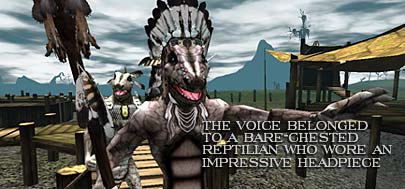
From what he told me, the Sadayel worship a god they sometimes refer to as
Draupnir, and sometimes as the Feathered Serpent. Supposedly, this god came
to the Sadayel in visions when they were just another tribe of primitive and
vicious-minded lizardmen, and he gave them the gifts of intelligence and magic.
The Sadayel say that Draupnir still works among them, through shamans, and
that the only thing he asks of them, is that they struggle against orkish overlordship
in Morak. Ultimately, it seems that Draupnir's hate isn't primarily directed
towards the orks, but towards the mysterious god they worship, Azhi Dahaka,
who is known as the Burning Serpent among the Sadayel.
For three days I explored the village during daylight hours, conversed with
the shaman in the evenings, and then slept on a bed of grass in a small but
comfortable hut. On the dawn of the fourth day, the shaman arranged for a group
of warriors to escort me to the Mercian border, and while I was sad to be leaving
my new-found lizard friends, I was also looking forward to the creature comforts
of the human kingdom. It was time invest some of my Dunkar winnings in embarrassing
amounts of mirdain sunwine, a reptile-free meal, and a soft bed.
|
